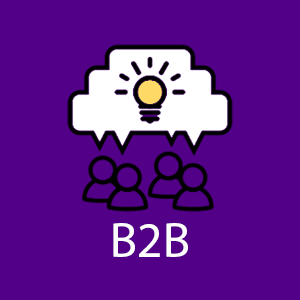
In today’s fast-paced B2B landscape, effective collaboration is paramount for success. With teams often distributed across different locations and time zones, leveraging the right tools and adopting appropriate collaboration strategies is crucial. Let’s explore 10 essential collaboration tools and delve into strategies tailored for B2B teams, including what sets B2B collaboration apart and what teams should be doing differently.
Understanding B2B Team Collaboration
B2B collaboration differs from its B2C counterpart due to its focus on business relationships, complex sales cycles, and often specialized products or services. In B2B, collaboration extends beyond internal teams to include partners, suppliers, and clients. Therefore, effective collaboration tools and strategies must accommodate these unique dynamics.
Strategies for B2B Team Collaboration
- Cross-functional Collaboration: Encourage collaboration across different departments or organizations involved in B2B projects or partnerships, fostering a holistic approach to problem-solving and decision-making.
- Clear Communication Channels: Establish clear communication channels and protocols to ensure that information flows smoothly within and across B2B teams, minimizing misunderstandings and delays.
- Transparency and Accountability: Foster a culture of transparency and accountability within B2B teams, ensuring that roles, responsibilities, and expectations are clearly defined and adhered to throughout the collaboration process.
- Building Trust and Relationships: Prioritize relationship-building and trust among B2B team members and external stakeholders, as strong relationships form the foundation of successful collaborations in the B2B space.
- Adaptability and Flexibility: Embrace adaptability and flexibility in B2B collaborations, as market conditions, customer needs, and project requirements may evolve over time, requiring teams to adjust their strategies and approaches accordingly.
- Data-driven Decision Making: Leverage data and analytics to inform decision-making within B2B teams, enabling evidence-based strategies and solutions that drive business outcomes and deliver value to all parties involved.
- Continuous Improvement: Commit to continuous improvement within B2B teams, seeking feedback, identifying areas for optimization, and implementing iterative changes to enhance collaboration processes and outcomes over time.
B2B Collaboration Tools:
- Slack: serves as a centralized hub for B2B teams to communicate, share files, and organize discussions. Its intuitive interface fosters real-time collaboration, essential for B2B teams managing complex projects or engaging with external stakeholders.
- Microsoft Teams: As part of the Microsoft 365 suite, Teams provides a comprehensive solution for B2B collaboration. Its integration with Office apps streamlines workflows, making it ideal for B2B organizations seeking seamless collaboration within the Microsoft ecosystem.
- Zoom: high-quality video conferencing and screen sharing capabilities make it indispensable for B2B teams conducting remote meetings, client presentations, and training sessions. Its user-friendly interface facilitates engaging interactions, crucial for fostering strong business relationships.
- Google Workspace: offers a suite of cloud-based productivity tools, enabling B2B teams to collaborate in real-time on documents, spreadsheets, and presentations. Its collaborative features enhance efficiency, essential for B2B teams managing joint projects or partnerships.
- Asana: empowers B2B teams to organize tasks, track progress, and collaborate on projects in one centralized platform. Its project management features facilitate transparency and accountability, vital for B2B teams working across different departments or organizations.
- Trello: Trello’s visual approach to project management makes it a favorite among B2B teams. Its customizable boards and cards streamline task management, fostering collaboration and innovation within B2B project teams.
- Basecamp: centralizes communication, file sharing, and task management, making it a valuable tool for B2B teams seeking to streamline collaboration. Its simple interface and intuitive features promote transparency and alignment, crucial for B2B teams managing multifaceted projects or partnerships.
- Jira: is specifically designed for software development teams, offering agile capabilities and customizable workflows. B2B teams leverage Jira to plan, track, and release software projects collaboratively, ensuring alignment and efficiency throughout the development process.
- Monday.com: provides a visually appealing platform for B2B teams to plan, track, and manage projects and workflows. Its customizable boards and automations empower teams to collaborate effectively and achieve their goals with precision.
- Cisco Webex: offers a suite of collaboration tools, including video conferencing, messaging, and file sharing. B2B teams leverage Webex for virtual meetings, team collaboration, and client presentations, ensuring seamless communication and engagement.
Conclusion:
Successful collaboration within B2B teams is essential, requiring a nuanced approach that considers business relationships, project intricacies, and diverse stakeholders. By prioritizing strategies like cross-functional collaboration, clear communication, transparency, trust-building, adaptability, data-driven decision making, and continuous improvement, teams can navigate challenges effectively. Leveraging tools such as Slack, Microsoft Teams, Asana, and Trello streamlines workflows and enhances communication, facilitating seamless collaboration. Embracing these strategies and tools enables teams to seize opportunities, drive innovation, foster relationships, and achieve business objectives with confidence and agility in today’s competitive landscape. Continuous learning and improvement remain vital as collaboration evolves, ensuring B2B teams stay at the forefront of excellence.
